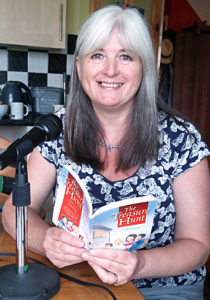Hello again, Christian writer friends, and welcome once again to another creative writing tip. I hope you are enjoying the hot, hot summer (unless you are reading this in the southern hemisphere, in which case, I hope you are enjoying the winter)! 🙂
This week’s writing tip is a bit more philosophical than most – don’t know where that came from!
Anyway, here’s the thought: If we don’t stop to decide what’s important to us, we just drift on, doing what comes to hand, and possibly not really making the most of the gifts we have been given. Does that resonate with you?
If it does, why not stop, take a few minutes on your own with a notebook and pen, and decide where you’d really like your writing to be going?

Write down the answers to the following questions:
- By the time you come to the end of your life, what would you like to look back on and see you had accomplished (I’m talking about your writing here, but feel free to repeat the process with other areas of your life)?
- What would you like to write first (now), and for whom?
- How long do you want the story to be?
- Will it be a one-off, or a series?
- When would be a reasonable date to finish the first story by?
- How are you going to fit in the time to achieve this aim?
You know what they say about planning: failing to plan is planning to fail – and there’s a lot of truth in that. If you don’t plan time to write, your story will almost certainly be pushed aside by all those other tasks that crowd in. How do I know? Personal experience! 🙂
 Hope that helps – love to hear of your writing plans!
Hope that helps – love to hear of your writing plans!
Every blessing,
Janet
P.S. The next online Write for a Reason course starts soon. If you want to take your writing to the next level, honestly, you will learn so much. And it’s a lot of fun! You can read more about it here, including testimonies of people who have done it: Writing Course.






 Lots love to you all (and don’t forget, nobody can write your story but you :-)),
Lots love to you all (and don’t forget, nobody can write your story but you :-)),



